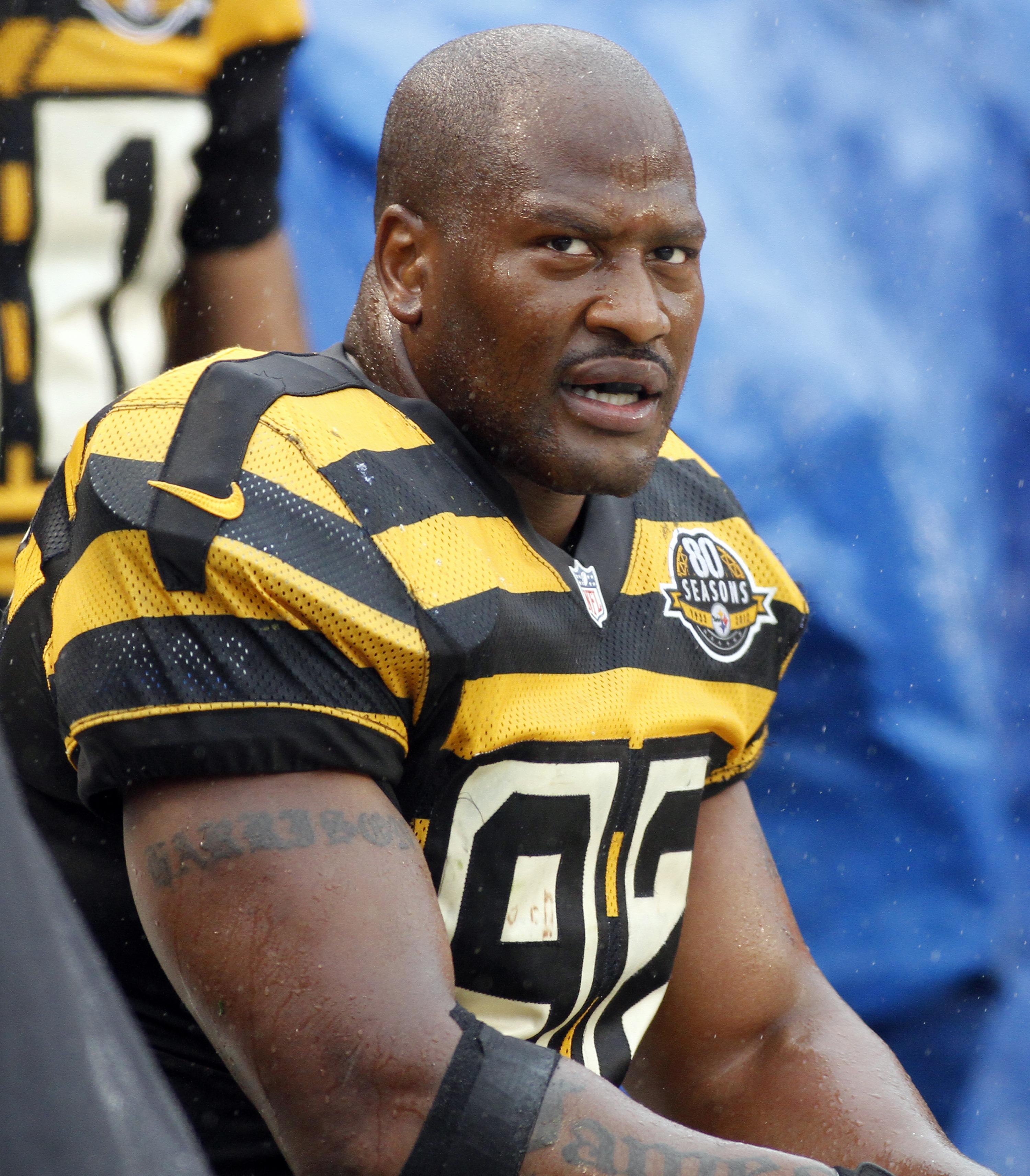Yesterday, former Pittsburgh Steelers linebacker James Harrison re-signed with the team (just three weeks after announcing his retirement from the NFL), sparking yet another case study in how the league ought to deal with players accused of domestic abuse, post-Ray Rice. Harrison was arrested in 2008 when, as he and his girlfriend fought over whether to baptize their son, he broke down a door she was hiding behind, destroyed her cell phone to prevent her from calling 911, and slapped her in the face. Harrison was charged with simple assault and criminal mischief; the charges were dropped when he agreed to undergo anger management and other counseling, and Harrison kept his spot in the Steelers line-up.
At the time, Steelers chairman Dan Rooney excused Harrison’s abuse because he executed it in the context of attempting to baptize his son. Rooney said that “what he was trying to do was really well worth it.” If the arrest had occurred yesterday, the Steelers would have been compelled to at least try to appear to take the incident more seriously. So some are suggesting that the team’s long-ago leniency with Harrison should catch up with him now: “The Steelers signing James Harrison is a bad move on and off the field,” USA Today’s Mike Foss weighed in.
Should domestic abusers be taken off the field forever? I’m not sure that’s a rule that will actually help the NFL promote a greater understanding of the dynamics of domestic violence, or prevent abuse in the future. Abusers can be rehabilitated with a lot of work—a 2004 CDC-funded study found that abusers who go through a batterer intervention program are 50 percent less likely to re-assault their partners than those who drop out—and that’s work in which the NFL should seriously invest. Viewing domestic abusers as potentially (but not necessarily) redeemable could help stop physical violence and controlling behaviors in these players’ homes and model a pathway toward preventing domestic violence in the league and in families across America.
But is James Harrison one of those success stories? I have no idea. Harrison hasn’t amassed more domestic violence charges since his 2008 arrest, but as Indiana University of Pennsylvania sociologist (and author of the batterer intervention study) Ed Gondolf told USA Today this week, arrest records don’t tell us whether an abuser is still operating with an “undertow of controlling behavior,” and they shouldn’t constitute the league’s sole guideline in assessing a player’s fitness for becoming a productive member of its institution. In a 2011 Men’s Journal profile, Harrison scowls at reporter Paul Solotaroff for arriving at his home five minutes early, calls Roger Goodell a “faggot,” poses for a photograph while gripping two selections from his gun collection, and proclaims, “My rep is James Harrison, mean son of a bitch who loves hitting the hell out of people.” Sure, this is part persona, but not entirely. As Amy Barasch wrote in Slate in January, domestic abusers who own guns pose a huge risk to both their intimate partners and police officers who attempt to intervene.
The fact that the Steelers have resigned Harrison is not an indication that they don’t take domestic violence seriously. But the recent words of Steelers coach Mike Tomlin might be. “It’s been seven years, and it is a different climate,” Tomlin said of Harrison’s re-signing with the team. “I’ve discussed directly that climate change with James. But knowing James over those seven or eight years, he’s grown a lot, as has his lady and I don’t anticipate that being an issue at all moving forward.” If the only thing that’s changed in the Harrison scenario is the “climate,” the Steelers might be in some trouble here. And stating that Harrison’s “lady” has grown with Harrison on this issue is a huge red flag that at least one NFL coach still believes victims are complicit in their abuse. (Remember when a college basketball coach told CBS this year that female coaches are incapable of turning “boys into men?” We’re still waiting for the NFL to prove that its own men are actually proficient at this task.)
Last week, the NFL made a big show about bringing in a cadre of domestic violence experts to advise the league on how to deal with the issue responsibly. And yet, owners and officials are still out front, spreading misinformation about the dynamics of domestic violence, excusing their players without any credible evidence that they’ve changed, and displaying a basic misunderstanding of how to talk about domestic violence.
Commentators who have called on the NFL to administer harsh suspensions of abusers say that action would “send a message” that the league doesn’t condone domestic violence. I don’t know how long a suspension has to be to communicate to the public that the league cares—I’m not sure anyone is in the position to pinpoint a universal standard—but I do think that teams have a responsibility to sustain their anti-domestic violence message as they bring players back into the fold. In this instance, I don’t necessarily think the Steelers have a responsibility to ban Harrison for life. But they should have to honestly demonstrate how he has worked and is working to change.
